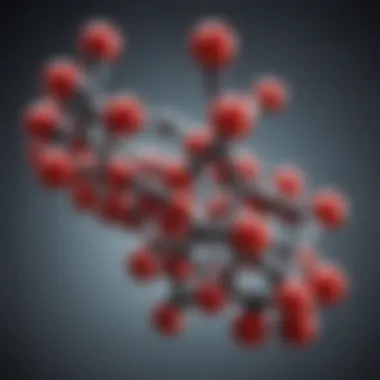Recommended Resveratrol Dosage: Key Insights


Intro
The significance of resveratrol has gained momentum in discussions surrounding dietary supplements and health benefits. This compound is predominantly found in red wine, grapes, and several berries, sparking interest due to its alleged health-promoting properties. Yet, as the popularity of resveratrol rises, many are left with questions regarding its effective dosage. This article delves into the recommended dosages of resveratrol, backed by scientific literature, to guide individuals seeking to harness its potential benefits.
Research Overview
Key Findings
Resveratrol's influence on human health is supported by various studies emphasizing its antioxidant, anti-inflammatory, and cardioprotective effects. Research indicates that daily dosages can vary widely, ranging from 100 mg to over 1,000 mg, depending on individual health contexts and specific goals. A notable study presented a range of outcomes based on dosage levels, highlighting that lower amounts might be sufficient for everyday health maintenance, whereas higher amounts may be necessary for addressing chronic conditions.
Study Methodology
Different methodologies have emerged in resveratrol research. Clinical trials often utilize control groups, placebo treatments, and objective measurements of biomarkers to assess efficacy. For instance, patients with metabolic syndrome may receive targeted doses ranging from 250 mg to 500 mg daily, measured against placebo groups to compare outcomes. This rigorous approach affords stronger evidence regarding the compound's benefits in specific populations while also refining dosage recommendations based on results.
Background and Context
Historical Background
Traditionally, resveratrol's allure has been linked to the French Paradox, a phenomenon where moderate red wine consumption correlates with lower rates of heart disease in France despite high saturated fat diets. This observation prompted extensive research into resveratrol's biological mechanisms, resulting in a surge of interest within both scientific and consumer circles.
Current Trends in the Field
As awareness grows, current trends focus on personalized nutrition and individualized therapy. Scientific discourse now often emphasizes the importance of standardized extracts versus whole food sources. Specific products such as Trans-Resveratrol capsules present a concentrated option, raising questions about the efficacy of natural resveratrol sources versus these supplements. Additionally, the conversation on dosage is expanding beyond general recommendations, striving towards more tailored approaches considering genetic factors and lifestyle choices.
"Understanding the individual context of resveratrol supplementation is crucial for maximizing health benefits."
Overall, those interested in adding resveratrol to their regimen should consult healthcare professionals and consider current research findings to identify the most suitable dosage for their needs.
Prologue to Resveratrol
Resveratrol has gained significant attention in scientific communities and popular media for its potential health benefits. This compound is often associated with longevity and various health-promoting properties. Understanding its dosage is paramount. Without proper dosage guidance, individuals may not experience the full range of benefits that resveratrol has to offer.
What is Resveratrol?
Resveratrol is a polyphenolic compound found primarily in grapes, berries, and certain plants. Its discovery as a beneficial compound can be traced back to the 1940s when research highlighted its antioxidant properties. Antioxidants are vital as they combat oxidative stress, which is linked to various chronic diseases. Resveratrol is best known for its role in red wine, often cited as a reason for the “French Paradox,” where people consume high-fat diets yet maintain good cardiovascular health.
Recent studies have suggested that resveratrol may also play a role in anti-aging processes due to its ability to mimic the effects of caloric restriction, which is known to enhance lifespan in several organisms. This positions resveratrol as not only a health supplement but as a subject of significant scientific interest.
Sources of Resveratrol
Resveratrol can be found in several natural sources. Here are the most notable:
- Red Wine: The fermentation process of grapes extracts resveratrol, with higher concentrations found in red wine compared to white.
- Grapes: Especially the skins of red and purple grapes contain considerable amounts of resveratrol.
- Berries: Blueberries and cranberries are particularly rich in this compound.
- Nuts: Peanuts and pistachios also provide resveratrol, although in smaller amounts compared to grapes.
- Japanese Knotweed: This plant is one of the richest sources of resveratrol and is often used in supplements.
Understanding where to source resveratrol enhances the ability to incorporate it into dietary habits, ensuring optimal intake for health benefits.
These sources show that integrating resveratrol into daily life is not solely dependent on supplements; rather, it can be achieved through a balanced diet rich in these foods. In the following sections, we will examine the recommended dosages and tailored approaches for different populations and health conditions.
The Science of Resveratrol
Understanding the science behind resveratrol is crucial for grasping its potential health benefits and the reasons behind recommended dosages. This section addresses the biochemical mechanisms that underlie resveratrol’s effects and its various biological impacts. Knowledge of these facets helps clarify why specific dosages may benefit different individuals depending on their health circumstances.
Mechanism of Action


Resveratrol functions primarily through various biochemical pathways. It activates the sirtuin family of proteins, particularly SIRT1, which plays a role in cellular processes such as aging, transcription, and apoptosis. Activation of these proteins is believed to improve metabolic health and promote longevity. Resveratrol’s purported ability to mimic caloric restriction is notable. Caloric restriction is associated with increased lifespan in many species, suggesting that the actions of resveratrol may parallel those benefits.
Additionally, resveratrol influences the expression of numerous genes related to inflammation and antioxidant defenses. This compound can increase the levels of antioxidants like superoxide dismutase, which combat oxidative stress. By counteracting oxidative damage, resveratrol helps protect against chronic diseases. Moreover, it also modulates the activity of enzymes like cyclooxygenase, affecting inflammatory responses within the body.
Biological Effects
The biological effects of resveratrol are diverse and significant. Research indicates that it has a protective role in several physiological systems. Some key effects include:
- Cardiovascular Protection: Resveratrol has been shown to confer benefits on heart health by improving endothelial function and lowering blood pressure. Its anti-inflammatory properties also contribute to better heart health.
- Metabolic Regulation: Studies suggest resveratrol may aid in glucose metabolism and increase insulin sensitivity, which is especially relevant for individuals at risk of diabetes.
- Neuroprotection: Resveratrol exhibits neuroprotective qualities that may protect against neurodegenerative diseases, such as Alzheimer's disease. Its influence on inflammation and oxidative stress in neuronal cells is a focal point of ongoing research.
- Cancer Prevention: Evidence suggests that resveratrol may inhibit the proliferation of cancer cells and induce apoptosis in certain types. Its role in modulating gene expression related to cancer is under investigation.
"Resveratrol demonstrates a wide range of potential health benefits, reflected in its various mechanisms of action across multiple biological systems."
In summary, understanding the science of resveratrol encompasses its mechanisms of action and the promising biological effects it exhibits. This knowledge not only supports the discussion of dosages but also highlights the relevance of individualized recommendations to maximize its health potential.
Health Benefits of Resveratrol
The health benefits of resveratrol have gained considerable attention over the years. This compound, found primarily in red wine and certain berries, appears to offer several health advantages that can enhance overall well-being. The relevance of discussing these benefits lies in the growing interest in natural compounds that can contribute to long-term health. Understanding the specific effects of resveratrol empowers individuals to make informed decisions regarding supplementation and its potential incorporation into their daily health regimen.
Cardiovascular Health
Resveratrol demonstrates notable potential in promoting cardiovascular health. Several studies suggest that this compound can improve heart function and reduce the risk of heart diseases. It achieves this by promoting the production of nitric oxide, which contributes to vascular dilation, improving circulation and lowering blood pressure.
Furthermore, resveratrol is associated with a reduction in low-density lipoprotein (LDL) cholesterol, often referred to as bad cholesterol. By decreasing LDL levels, resveratrol aids in preventing the formation of plaque in the arteries, which is crucial for maintaining cardiovascular health. In summary:
- Improves circulation by increasing nitric oxide production.
- Lowers LDL cholesterol, reducing the risk of arterial plaque.
Research indicates that the regular consumption of resveratrol may correlate with a lower incidence of heart-related issues, making it a compelling compound for those focused on heart health.
Anti-Inflammatory Properties
The anti-inflammatory effects of resveratrol are critical for individuals experiencing chronic inflammation. This condition is a precursor to numerous health problems, including metabolic syndrome, heart disease, and certain cancers. Resveratrol can inhibit specific inflammatory pathways in the body, reducing markers of inflammation.
Studies highlight that resveratrol may help suppress the production of pro-inflammatory cytokines, which play a significant role in the inflammatory response. By modulating these processes, the compound contributes to lessening the burden of inflammation on the body. Key points about its anti-inflammatory properties include:
- Inhibits pro-inflammatory cytokines.
- Reduces markers of inflammation in the body.
This aspect of resveratrol becomes essential for those seeking natural methods to manage inflammatory conditions.
Potential Anti-Cancer Effects
Resveratrol also holds promise in the realm of cancer prevention and therapy. Evidence suggests that it may impact cancer cell growth and promote apoptosis, the process of programmed cell death. This dual action can prevent the proliferation of cancer cells and decrease the tumor size in various cancers.
Additionally, resveratrol has been found to interfere with several pathways involved in cancer progression, including angiogenesis, which is the formation of new blood vessels that supply tumors. The potential anti-cancer attributes of resveratrol includes:
- Promotes apoptosis in cancer cells.
- Inhibits angiogenesis, delaying tumor growth.
While further research is needed, these findings point to the significant role resveratrol might play in cancer prevention and treatment.
Neuroprotective Effects
The neuroprotective potential of resveratrol adds to its appeal as a multifunctional compound. Investigations suggest that resveratrol may have protective effects on brain cells by reducing oxidative stress and inflammation, which are key contributors to neurodegenerative diseases like Alzheimer's.
Moreover, resveratrol may enhance cognitive function and promote better memory retention. The mechanism behind this includes the activation of pathways that support brain health and plasticity. Notable points regarding its neuroprotective effects are:
- Reduces oxidative stress in brain cells.
- Enhances brain plasticity, aiding cognitive functionality.


Thus, with ageing being a well-known risk factor for cognitive decline, resveratrol could be valuable for those who wish to preserve cognitive health as they age.
Recommended Dosages of Resveratrol
Understanding the appropriate dosages of resveratrol is crucial for those seeking to harness its potential health benefits. The compound, recognized for its antioxidant properties, influences various biological pathways in the body. However, not all dosages are created equal. High dosages may lead to adverse effects, while insufficient amounts might not yield any benefits at all. Thus, determining the right amount of resveratrol is essential for optimal health outcomes.
With a variety of supplements available in the market, one may wonder how much resveratrol to take for various health purposes. The topic of recommended dosages encompasses several factors, including general guidelines, age-related variations, and considerations for specific health conditions. By understanding these aspects, individuals can tailor their resveratrol intake according to their needs and goals.
General Recommendations
Most studies suggest a range of 100 to 500 milligrams per day for healthy adults. This dosage often provides a balance between safety and efficacy, allowing individuals to experience the benefits of resveratrol without significant risks. Factors that influence this recommendation include:
- Bioavailability: Resveratrol is poorly absorbed, so higher doses may be necessary for effectiveness.
- Duration of Use: Long-term use may require adjustments in dosage for sustained effects.
- Formulation Differences: The formulation of the supplement can impact its absorption. For instance, extracts may differ from whole-food sources.
It is also prudent to consult with a healthcare professional before starting any new supplement regimen. They can provide tailored recommendations based on individual health profiles and potential medication interactions.
Variations by Age
As people age, their body's ability to metabolize supplements changes. Therefore, dosages of resveratrol may need adjusting based on an individual's age. Seniors often experience slower metabolic rates and may benefit from lower doses. Studies indicate that older adults may effectively utilize as little as 100 mg. Conversely, younger adults may start with higher doses, particularly if managing specific health conditions.
Factors to consider include:
- Metabolic Rate: Youths may process higher amounts more efficiently.
- Comorbidities: Older individuals often have multiple health conditions that may require careful consideration of supplement interactions.
- Body Weight: This can influence how individuals respond to certain dosages.
Considerations for Specific Health Conditions
People with specific health conditions may require tailored dosages. For instance, individuals with cardiovascular issues might benefit from higher doses, while those with liver conditions should be cautious due to the metabolic load. Below are examples of considerations based on health conditions:
- Cardiovascular Health: Research suggests dosages upwards of 500 mg can support heart health. Consultation with a doctor is essential for exact guidance.
- Diabetes: Some studies imply that lower doses around 100 mg may help with insulin sensitivity.
- Cancer Support: Higher dosages are often studied for their potential to inhibit cancer cell growth but require professional supervision due to possible side effects.
In summary, determining the appropriate dosages of resveratrol is complex and depends on individual factors including age, health conditions, and the specific formulation of supplements. Knowledge of these recommendations can significantly enhance one's health journey, ensuring that choices made regarding resveratrol consumption are informed and effective.
Forms of Resveratrol Supplements
Understanding the forms of resveratrol supplements is crucial for individuals seeking to incorporate this compound into their health regimen effectively. Each form offers distinct benefits, absorption rates, and convenience that can cater to varying preferences and lifestyles. This section examines the two most common forms of resveratrol supplements: capsules and tablets, as well as liquid extracts.
Capsules and Tablets
Capsules and tablets are among the most popular formats for resveratrol supplementation. These forms are typically convenient and easy to use, making them a favorable choice for many people. The advantages of capsules and tablets include precise dosage, which ensures that users receive a consistent amount of resveratrol with each intake.
Capsules often contain powdered forms of resveratrol, while tablets might also include binders and fillers. The protective casing of capsules can enhance shelf life by shielding the content from light and moisture, factors that can degrade the quality of the supplement.
However, it is important to consider that capsules may vary in terms of dissolution time. Some may dissolve quickly, while others may take longer, affecting how effectively the resveratrol is absorbed in the body. This aspect can be crucial for individuals who require immediate effects or specific timing for their doses.
Liquid Extracts
Liquid extracts of resveratrol present another viable option for supplementation. These forms may offer faster absorption than solid forms, as liquids generally require less time to dissolve. This can be significant for users looking for quick benefits, such as those seeking to manage inflammation or promote heart health.
Liquid resveratrol can often be mixed with beverages, enhancing user experience and compliance. Many users find this form preferable due to its versatility and ease of consumption. However, it is worth noting that liquid extracts may have a shorter shelf life compared to capsules and tablets, often requiring refrigeration or specific storage conditions.
"The form of resveratrol supplement you choose can greatly influence its effectiveness and your adherence to the regimen. Always evaluate your individual needs and consult with a healthcare professional if uncertain."
Safety and Side Effects


Understanding the safety and potential side effects of resveratrol is crucial for any individual considering its use. While resveratrol is celebrated for its possible health advantages, acknowledging the risks associated with its consumption is equally important. This section will delve into the common side effects of resveratrol and its interactions with medications, providing a balanced view that empowers readers to make informed choices.
Potential Side Effects
Despite natural resveratrol's relative safety, some individuals may experience side effects, especially when taken in high doses. Commonly reported side effects include:
- Gastrointestinal Issues: Users often report digestive problems, such as diarrhea, nausea, or upset stomach.
- Headaches: Some have noted headaches as a side effect, which can occur due to fluctuations in blood pressure.
- Allergic Reactions: Rarely, allergic reactions may occur, manifesting as itching, rash, or swelling.
These side effects are generally mild and tend to resolve once the supplement is discontinued. However, it is advisable for new users to start with lower doses and monitor their body's response.
"Understanding the potential side effects is paramount to ensuring a safe and effective experience with resveratrol supplements."
Interactions with Medications
The interaction of resveratrol with certain medications can have significant implications for users, making it essential to understand these possibilities. Here are key points to consider when taking resveratrol alongside other medications:
- Blood Thinners: Resveratrol may enhance the effects of anticoagulants, such as warfarin. This can increase bleeding risk, particularly in individuals already on these medications. Regular monitoring is advisable.
- Nonsteroidal Anti-Inflammatory Drugs (NSAIDs): Concurrent use of resveratrol with NSAIDs may increase the risk of gastrointestinal bleeding.
- Anticancer Drugs: Research shows that resveratrol may interfere with certain chemotherapeutic agents. It's crucial for cancer patients to discuss with their healthcare providers before using this supplement.
As interactions can vary based on individual health status and other factors, consulting a healthcare professional before beginning resveratrol supplementation is a necessary step to ensure safety and efficacy.
Research and Studies
Research plays a crucial role in understanding the recommended dosage of resveratrol. It helps delineate effective and safe amounts necessary for maximizing the health benefits associated with this compound. As scientific knowledge evolves, so do recommendations based on various findings. This section highlights the significance of clinical trials and other studies that dive into dosages, effects, and long-term impacts of resveratrol consumption. Evaluating these studies can provide essential insights for individuals deciding to use resveratrol as a supplement.
Clinical Trials Overview
Numerous clinical trials investigate the efficacy of resveratrol in various health contexts. These trials often vary in design, population, and dosages examined. In some studies, participants consume resveratrol in forms such as capsules or liquid extracts, while others engage in dietary interventions.
Most clinical trials aim to observe the outcomes associated with cardiovascular health, inflammation responses, and other critical areas. Participants often receive dosages ranging from 100 mg to 1,000 mg daily. Evidence gathered from these trials forms the basis for guiding users on appropriate levels of intake.
Assessments usually include biochemical markers, surveys on wellbeing, and even imaging studies to gauge structural changes in health over time. The variability in results from these trials emphasizes the importance of personalized approaches to supplementation.
Key Findings and Finales
Several key findings emerge from the synthesis of resveratrol research. First, many studies suggest that resveratrol displays promising effects on cardiovascular health, potentially reducing the risk of heart disease. Participants who took resveratrol supplements often showed improvements in endothelial function and reductions in markers of inflammation.
Secondly, the studies indicate that sex, age, and existing health conditions play major roles in determining the appropriate dosage for each individual. Older adults, for instance, may experience different benefits than younger ones, suggesting the need for tailored dosages based on demographic factors.
Furthermore, long-term use appeared safe at moderate levels; however, high doses raised concerns about potential side effects for some individuals. According to aggregated data, the most beneficial outcomes often align with regular, consistent intake of resveratrol.
Overall, the research underscores the necessity for ongoing studies, as emerging findings may redefine optimal dosages. Understanding the insights from clinical trials enhances our grasp of effectively utilizing resveratrol and supports a more informed approach to supplementation.
"Scientific inquiry is the backbone of nutritional recommendations, shaping our understanding of how compounds like resveratrol function in the human body."
Epilogue
The conclusion section of this article encapsulates the critical relevance of understanding the recommended dosages of resveratrol. As scientific research continues to evolve, knowledge about appropriate dosages plays an essential role in maximizing the health benefits associated with this compound. There exists a delicate balance between efficacy and safety; effective levels can vary widely based on individual health conditions, age, and specific health objectives.
Understanding these nuances allows individuals to make informed decisions about incorporating resveratrol into their routines. Certain populations, such as older adults or those with health conditions, may require distinct dosages to achieve desired outcomes without adverse effects. Furthermore, professional guidance can enhance the safety profile of supplementation.
In summary, considering personalized recommendations is paramount. This bespoke approach supports optimal health while minimizing the risks linked to improper usage. The careful calibration of dosages based on current research findings can result in improved overall wellness and longevity.
Summary of Recommendations
Recommendations for resveratrol intake should be tailored to individual needs. The following points summarize the essential guidance:
- General Dosages: Most studies indicate a range from 100mg to 500mg daily shows beneficial effects.
- Age Variations: Older adults may benefit from higher dosages, recommended closely with a healthcare provider.
- Health Conditions: Individuals with specific health conditions such as cardiovascular diseases should consult professionals for precise dosage determinations.
- Forms of Resveratrol: The method of consumption impacts bioavailability; liquid extracts may be absorbed more effectively than capsules.
Always consult with a healthcare provider to tailor the dosage to your unique health requirements.
Overall, the integration of resveratrol into a health regimen should be approached with careful thought. The ultimate goal is to ensure optimal health benefits while maintaining safety.







